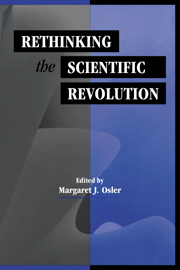Book contents
- Frontmatter
- Contents
- List of Contributors
- Preface
- Introduction
- Part I The Canon in Question
- Part II Canonical Disciplines Re-Formed
- Part III Canonical Figures Reconsidered
- 9 Pursuing Knowledge: Robert Boyle and Isaac Newton
- 10 The Alchemies of Robert Boyle and Isaac Newton: Alternate Approaches and Divergent Deployments
- 11 The Janus Faces of Science in the Seventeenth Century: Athanasius Kircher and Isaac Newton
- 12 The Nature of Newton's “Holy Alliance” between Science and Religion: From the Scientific Revolution to Newton (and Back Again)
- 13 The Fate of the Date: The Theology of Newton's Principia Revisited
- 14 Newton and Spinoza and the Bible Scholarship of the Day
- Part IV The Canon Constructed
- Index
14 - Newton and Spinoza and the Bible Scholarship of the Day
Published online by Cambridge University Press: 25 October 2009
- Frontmatter
- Contents
- List of Contributors
- Preface
- Introduction
- Part I The Canon in Question
- Part II Canonical Disciplines Re-Formed
- Part III Canonical Figures Reconsidered
- 9 Pursuing Knowledge: Robert Boyle and Isaac Newton
- 10 The Alchemies of Robert Boyle and Isaac Newton: Alternate Approaches and Divergent Deployments
- 11 The Janus Faces of Science in the Seventeenth Century: Athanasius Kircher and Isaac Newton
- 12 The Nature of Newton's “Holy Alliance” between Science and Religion: From the Scientific Revolution to Newton (and Back Again)
- 13 The Fate of the Date: The Theology of Newton's Principia Revisited
- 14 Newton and Spinoza and the Bible Scholarship of the Day
- Part IV The Canon Constructed
- Index
Summary
We now think that any serious religious person would be dismayed by the Bible scholarship of Spinoza and Father Richard Simon. But, though they shocked many of the theologians of the late seventeenth century and afterward, they also carried further historical and critical inquiries about the biblical text that had been developing from the late Middle Ages and through the Reformation and Counter-Reformation. Isaac Newton, who devoted about sixty years of his life to studies about the Bible seems to have been affected positively by points made by Spinoza and Simon. And this is curious in that two hundred years later Newton's own exegesis of the books of Daniel and Revelation was republished by the former head of the British Medical Association, Professor William Whitla of Queens College, Belfast, as an answer to the higher criticism of the Bible that had been developed from the ideas and methods of Spinoza and Simon by German scholars in the nineteenth century.
First, did Newton actually know the texts of either of these radical biblical exegetes? We know that he knew of Simon's work, since he owned copies of five of his books, and cited them occasionally in his own work. We know he had ample opportunity to know of Spinoza's writings, especially the work that deals extensively with the Bible, the Tractatus Politico Theologicus It was in the library of Isaac Barrow that Newton had cataloged. The work was known to his colleagues at Cambridge, Ralph Cudworth and Henry More, both of whom were exercised about Spinoza's views and attacked them in print.
- Type
- Chapter
- Information
- Rethinking the Scientific Revolution , pp. 297 - 312Publisher: Cambridge University PressPrint publication year: 2000
- 1
- Cited by

